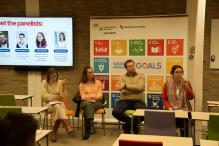Kuala Lumpur and London, 25 September 2023 — In the wake of the COVID-19 pandemic, a new policy paper titled "Global Health Security and the Health-Security Nexus: Principles, Politics and Praxis" in the journal BMJ Global Health, warns of dangers and potential pitfalls associated with the increased attention paid to ‘global health security’ and the growing interaction between public health and security actors.
According to the authors, the prevailing discourse on global health security is focused on infectious disease threats and the concerns of high-income populations, and ignores crucial aspects of political, economic and food insecurity that largely affect low-income populations. To address these issues, the authors introduce two contrasting conceptualizations of health security: neo-colonial health security and universal health security.
Neo-colonial health security privileges the security of wealthier populations and countries, while typically identifying poor countries and populations as the threat source, usually via the vector of naturally occurring disease outbreaks.
According to lead author Professor David McCoy, “Neo-colonial health security focuses on the use of bio-security technologies including diagnostics, vaccines and medicines. Universal health security is more inclusive of the needs of poorer populations and accommodates a broader range of threats to health, including poverty, hunger, poor access to healthcare and human rights abuses, whereby diseases and vulnerability to pandemics are viewed as an outcome of insecurity as much as a cause of insecurity”.
The paper also presents a novel heuristic framework comprising five scenarios in which health and security agendas and actors intersect in different ways and argues that these intersections have remained largely unstudied.
"The evolving landscape of global health security necessitates a profound re-evaluation. This framework offers critical insights, shedding light on the intersections of health and security, as we navigate the complex path toward equity and decolonial approaches," said David McCoy.
The research also sounds an alarm about the growth of a 'security industrial complex' within which public health regimes may become rooted in bio-technological, coercive and authoritarian approaches to health security that threaten human rights and undermine efforts to combat inequality.
The Director of the United Nations University International Institute for Global Health, Rajat Khosla, further adds, "This paper raises concern about the potential for powerful corporate actors to dominate multi-billion-dollar health security budgets and highlights the need for transparency and close monitoring of the pandemic funds, treaties and medical countermeasures platforms that are being established."
The paper calls for more public debate about the evolving health-security landscape and the growing influence of security sector actors in global health.
This new analysis offers vital insights for policymakers, practitioners and scholars in the field, signaling the need for a profound shift in global health security paradigms.
###
Read the journal article via this link: https://gh.bmj.com/content/8/9/e013067
Cite the journal article as: McCoy D, Roberts S, Daoudi S, et al. Global health security and the health-security nexus: principles, politics and praxis. BMJ Glob Health 2023;0:e013067. doi: http://dx.doi.org/10.1136/bmjgh-2023-013067
For media inquiries or interviews with the authors, please contact:
Gopi Kharel — Knowledge Management and Communications Manager, UNU International Institute for Global Health, Kuala Lumpur, Malaysia
Email: gopi.kharel@unu.edu
Information and contact details of the authors:
David McCoy, BMed, MPhil, DrPH — UNU International Institute for Global Health, Kuala Lumpur, Malaysia
- Email: mccoy@unu.edu
Stephen Roberts, MA, DPhil — UCL Institute for Global Health, University College London
- Email: stephen.roberts@ucl.ac.uk
Salma Daoudi, MPhil — Somerville College, University of Oxford
- Email: salma.daoudi@some.ox.ac.uk
Jonathan Kennedy, MA, DPhil — Wolfson Institute of Population Health Sciences, Queen Mary University of London
- Email: j.kennedy@qmul.ac.uk
Note to editors: High-resolution images and additional information about the authors are available upon request.



